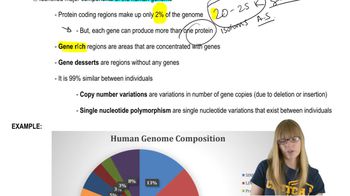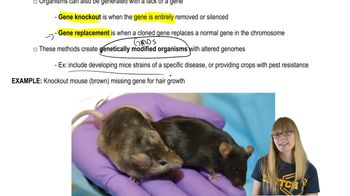Table of contents
- 1. Introduction to Genetics51m
- 2. Mendel's Laws of Inheritance3h 37m
- 3. Extensions to Mendelian Inheritance2h 41m
- 4. Genetic Mapping and Linkage2h 28m
- 5. Genetics of Bacteria and Viruses1h 21m
- 6. Chromosomal Variation1h 48m
- 7. DNA and Chromosome Structure56m
- 8. DNA Replication1h 10m
- 9. Mitosis and Meiosis1h 34m
- 10. Transcription1h 0m
- 11. Translation58m
- 12. Gene Regulation in Prokaryotes1h 19m
- 13. Gene Regulation in Eukaryotes44m
- 14. Genetic Control of Development44m
- 15. Genomes and Genomics1h 50m
- 16. Transposable Elements47m
- 17. Mutation, Repair, and Recombination1h 6m
- 18. Molecular Genetic Tools19m
- 19. Cancer Genetics29m
- 20. Quantitative Genetics1h 26m
- 21. Population Genetics50m
- 22. Evolutionary Genetics29m
15. Genomes and Genomics
Genomics and Human Medicine
Problem 13a
Textbook Question
Imagine yourself in the same position as Kristen Powers, faced with the decision of whether or not to undergo a genetic test that will discover if you have inherited Huntington disease. List five life decisions or choices that you think are likely to be affected by the results of the genetic test. Do you think you would make the same choice to test that Kristen made? Why or why not?
 Verified step by step guidance
Verified step by step guidance1
Consider the impact of the genetic test results on family planning decisions, such as whether to have children or pursue alternative options like adoption.
Reflect on career choices and long-term professional goals, taking into account the potential need for flexibility or early retirement.
Evaluate financial planning strategies, including savings, insurance, and investments, to prepare for possible future healthcare needs.
Think about personal relationships and how the knowledge of the genetic test results might influence commitments or support systems.
Contemplate lifestyle choices, such as health and wellness practices, that could be adjusted based on the genetic test outcomes.
Recommended similar problem, with video answer:
 Verified Solution
Verified SolutionThis video solution was recommended by our tutors as helpful for the problem above
Video duration:
1mPlay a video:
Was this helpful?
Key Concepts
Here are the essential concepts you must grasp in order to answer the question correctly.
Genetic Testing
Genetic testing involves analyzing an individual's DNA to identify genetic disorders or predispositions to certain diseases. In the context of Huntington's disease, a genetic test can reveal whether a person has inherited the mutated gene responsible for the condition, which can significantly impact personal and family planning decisions.
Recommended video:
Guided course

History of Genetics
Huntington's Disease
Huntington's disease is a hereditary neurodegenerative disorder caused by a mutation in the HTT gene. It typically manifests in mid-adulthood and leads to progressive motor dysfunction, cognitive decline, and psychiatric issues. Understanding the implications of this disease is crucial for individuals considering genetic testing.
Recommended video:
Guided course

Genomic Variation
Psychosocial Impact of Genetic Information
The psychosocial impact of genetic information refers to the emotional and social consequences that arise from knowing one's genetic status. This can include anxiety, changes in relationships, and decisions about family planning, career choices, and lifestyle. Individuals must weigh these factors when deciding whether to undergo genetic testing.
Recommended video:
Guided course

Modern Genetics

 6:51m
6:51mWatch next
Master Human Genome Composition with a bite sized video explanation from Kylia Goodner
Start learningRelated Videos
Related Practice



